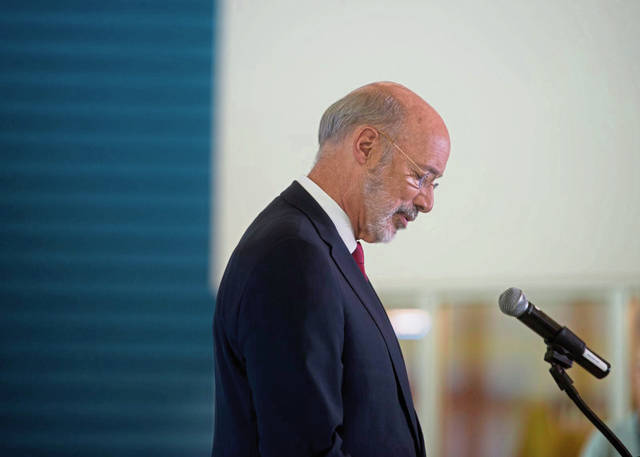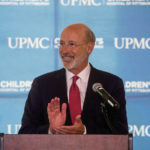A new initiative championed by Gov. Tom Wolf urges the Legislature to take action after Pennsylvania ranked sixth in the number of lead-poisoned children in a recent study.
Lead Free PA would establish universal lead testing for children, which would be done through a finger prick, and implement regional response teams to address issues across the state. The teams would focus on finding the source of lead exposure and creating a response plan.
Speaking to doctors and health care officials Thursday at UPMC Children’s Hospital of Pittsburgh, Wolf said that 70% of homes, schools and child care facilities built before 1978 have potential lead exposure through water, paint and pipes. Lead-based products were banned in 1978 because of safety concerns.
Pennsylvania reported in 2017 that 51,600 children ages 1 to 5 had blood lead levels of 10 micrograms per deciliter or higher in 2010, according to a Public Health Institute study published in the journal Pediatrics. That’s 3.7 cases per 1,000 children.
“This isn’t good for the future of Pennsylvania,” Wolf said.
Lead exposure can impact children neurologically. High levels of lead exposure can lead to seizures, comas and death, while low doses can lead to cognitive and developmental effects, hyperactivity and problems focusing, said LuAnn Brink, chief epidemiologist with the Allegheny County Health Department.
She added that there are no safe levels of lead exposure.
Pittsburgh Mayor Bill Peduto said, “We deal with it on a local level with our infrastructure. An infrastructure that dates back to the Civil War. An infrastructure that has been disinvested in for decades and we realize that there’s a cost to that.”
Peduto said communities such as Morningside, Mt. Washington and Homewood are priorities in terms of lead exposure.
Almost $49 million was also granted to the Pittsburgh Water and Sewer Authority to replace lead pipes. So far, about 4,500 homes in the city no longer use lead pipes. About 8,000 homes will be impacted by 2021. By the end of 2024, city homes and businesses will no longer be serviced by lead pipes.
“That could only happen through the partnership with the state, the partnership with the county and by raising the rates, which we have to do in order to be able to pay the bills,” Peduto said. “Yes, this will be a burden to those using the system presently. But it will be what we deserve to give to the Pittsburgh of tomorrow.”
Of the initiative, Peduto said, “It means we can do something to actually keep families safe.”
Allegheny County is ahead of the game in terms of universal lead testing.
Starting in January 2018, children between 9 and 12 months old and again at 24 months old had to be tested for lead exposure.
In July, lead levels in Pittsburgh’s water system were decreasing but remained above federal thresholds, according to test results by the Pittsburgh Water and Sewer Authority. PWSA said the drop indicates an additive the authority started using in April that coats lead pipes to prevent them from contaminating the water is working.
Wolf did not elaborate on specific plans for rural parts of the state, but said, “I lived in a small town in York County, and I lived in a house built in the 1850s, and my wife and I spent a lot of time fixing that place up. A lot of that was getting rid of the lead paint, getting new pipes into the house we raised our two children in.
“The number of homes is pretty spread out throughout Pennsylvania, so it’s Westmoreland County, York County, Philadelphia County — it’s all over.”





















